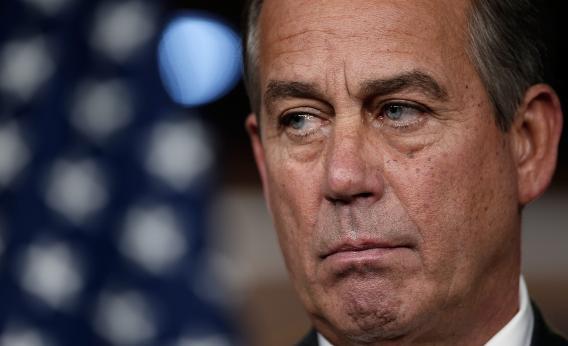Fred Hiatt wants a plan to reduce the budget deficit. And to his credit, he acknowledges that the Obama White House has articulated such a plan and that it’s more sensible and fair than the plan offered by House Republicans. That said, he still criticizes the president for shying away from talk about “hard choices.” Then he dons the noble lenses of BipartisanThink to explain why the choices he’s actually offering are bad choices:
Now he reassures Americans that the nation’s fiscal problems can be solved with no pain. Middle-class taxes will never rise. A carbon tax is not to be mentioned. Pre-kindergarten education can be provided to all without increasing the deficit “by a single dime.” The only tax loopholes that need closing are distortions “that nobody really defends on their own,” as he told ABC’s George Stephanopoulos. Entitlement reform can be modest.
If it were that easy, even this Congress would have done it by now.
Hiatt’s method is to exploit an ambiguity in the meaning of the word easy. Is it easy to write down a mathematically workable plan for fiscal sustainability in which the money comes overwhelmingly from wealthy individuals and health care providers, with middle-class seniors taking a small hit via switching to a less-generous inflation calculation method? Yes, it is easy. The White House has done it. Senate Democrats have done something broadly similar. But is it easy to get such a plan enacted into law? No, it’s not easy, because Republicans have a strongly held view that higher taxes on high-income individuals would be immoral and economically ruinous paired with a weaker but real view that cuts in Medicare provider payments are wrong. Overcoming entrenched political opposition is hard in the American system of government. But saying that a plan faces large political obstacles isn’t the same as saying that the plan is unworkable on the merits.
Yet this is the core of the higher BipartisanThink. Republicans err by being unreasonable, while Democrats err by failing to accept that unreasonableness as the premise of bargaining.
Now for my part I think we should have a carbon tax. Climate change is a big deal, and a carbon tax is a potent tool for fighting it. I wish the White House would say so. But in broader deficit terms, the fact of the matter is that per capita GDP in 2013 is much higher than it was in 1983, and yet an extremely large share of income gains have accrued to a small minority of wealthy people. Insofar as there’s a need for fiscal austerity, the bulk of that austerity ought to come out of those people’s pockets. Willie Sutton said he robbed banks because that’s where the money is. The high-income crowd is where the increased incomes are, and that’s a natural place to look for more money.
